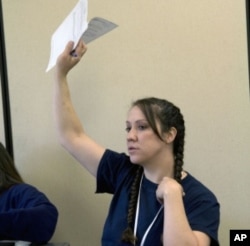It can be hard to find a job in the current tight U.S. economy, especially when you have a criminal record. At one prison in the American Northwest, inmates are learning not just how to get jobs, but how to open businesses of their own.
A class called LIFE (Lifelong Information For Entrepreneurs), at the Coffee Creek Correctional Facility, teaches inmates how to start their own businesses after they’re released from the Oregon women’s prison.
MercyCorps Northwest, the local branch of a global development organization, started the program four years ago, based on its experience in international aid.
“We were looking for ways that we could apply our expertise around economic development and small business management to populations that could use it," says Doug Cooper, assistant director of MercyCorps Northwest. "It’s identical to what we do internationally, except we apply it here in Oregon and Washington.”
The eight-month class mixes hardcore small business training with softer skills like goal setting and self care. Student Saresa Whitley is serving five years for assault. She has a job lined up after her release in January, but plans to also start a small business selling handicrafts.
“When I was talking about knowing if my business is viable or not, through a profit-and-loss model, I was like ‘Wow, I didn’t even know the word viable before, and now I do,’" Whitley says. "I’ve learned a lot, I’ve learned a lot about how to write a business plan, about effective communications skills, how to listen, something I didn’t know how to do before.”
These lessons are an important part of the program. In fact, says student Cynthia Thompson, who’s serving time for ID theft, they’re kind of the point.
“I think the goal of it is to produce people that are being part of the community, paying their taxes and being volunteers. Not just necessarily successful small businesses, but just successful, accountable people in the community.”
So far it seems to be working. It’s too soon for official results, but unofficially, MercyCorps says only three of its approximately 100 graduates have returned to prison. That’s way below the national recidivism rate, which is over 50 percent. Graduates have opened courier businesses, cosmetology salons and craft stands at farmer’s markets.
Lori graduated from the first LIFE class while in prison for aggravated theft and now runs an auto repair shop. She prefers not to give her last name because she worries about the stigma of being an ex-convict.
“We work so hard, and we go the extra mile for any customers, and, you know, bad word of mouth spreads faster than anything else,” she says.
Even after graduating, Lori continued to check in with a MercyCorps mentor. Together, they worked through a whole host of small business questions.
“What works, what doesn’t? And is it worth having a website of your own, and what avenues of advertising can you exploit for free?" Lori says. "Those are the type of things that I found invaluable.”
MercyCorps Northwest just started up another LIFE program at a women’s prison in Washington state. Cooper hopes the idea spreads throughout the country’s prisons and their 1.5 million inmates.
“Ninety-five, 96 percent of those people are going to come back to our communities with the stigma of being an ex-felon," he says. "And to the extent that we make it hard for them to come back and be successful, it hurts everybody. It hurts our community. It hurts our tax base.”
Cooper believes helping former inmates succeed is what a corrections system should be about. Student Saresa Whitley plans to apply what she’s learned to that small craft business - and also to her life.
“When I walk in that room, I’m not just a number anymore. I’m a person," she says about the LIFE classes. "And they have taught me to set goals, and I didn’t have that before. I didn’t have that hope that I can do something different.”





